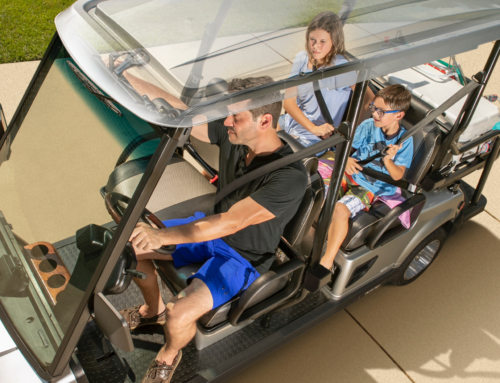Insurance is intended to provide peace of mind regarding any vehicle, from theft, damage, or personal injury. The same applies to golf carts and LSVs, (low speed or neighborhood vehicles), and you need to research what type of coverage is required, what it will cover and how to buy it.
Of course, different states may have unique requirements for insuring a cart, so be sure to check your local municipality’s rules and laws before buying a policy. Also, even though your state may not require that your cart be insured, you may live in a residential community with HOA rules requiring it, like a mobile home park, country club development or other gated community.
LSVs that are fully equipped with all of the features and required safety equipment to legally qualify as street legal will likely require insurance coverage that is different than insuring a cart you only use for golf and getting to and from the clubhouse. In general, an LSV that is properly equipped as street legal can travel on roadways with speed limits of 35-mph or less, so you can imagine that you should be adequately insured in the event that you are struck by a car if you’re crossing from your community to the grocery store across the street.
Let’s look at different scenarios around the country.
South Carolina Golf Cart Insurance
According to the South Carolina Department of Motor Vehicles:
- The golf cart must be insured, permitted, and registered with SCDMV using the following link, http://scdmvonline.com/Vehicle-Owners/Types-Of-Vehicles/Golf-Cart.
- The golf cart must remain within 4 miles of an address listed on the SCDMV permit.
- The golf cart may be operated on roads with posted speeds of 35 mph or less.
- The golf cart may be operated during daylight hours only.
- The driver must be at least 16 years old with a valid driver’s license.
South Carolina golf cart insurance is very much like purchasing a policy for your passenger car. You’ll be required to carry a minimum of $25,000 in liability coverage per person, $50,000 liability per accident and $25,000 in property damage coverage. Just like with your car, you can purchase additional options for things like comprehensive and collision coverage, which protects you against claims on incidents like being struck by another vehicle, theft, natural disaster damage, fire, or flood damage.
Golf cart insurance policies are not as simple as just adding your cart to your existing auto or homeowners’ policy. You may be able to purchase separate coverage under a Utility Vehicle, Motorcycle or Recreational Vehicle policy.
Florida Golf Cart Insurance
The sunshine state has a huge and growing population that are using golf carts and LSVs to get around, especially in cart-centric communities like The Villages in Central Florida. Without proper and adequate insurance coverage, you open yourself up to potential liability and financial hardships.
According to Florida Department of Highway Safety and Motor Vehicles (FLHSMV) guidelines, golf cart insurance is not mandatory. However, if you modify your older golf cart to be street legal or purchase a low speed vehicle (LSV), that is fully legal for street operation, insurance is mandatory.
Many people think that their cart or LSV will be covered under their homeowner’s policy or auto coverage, but quickly find out that this is not the case. A separate policy covering your golf cart is your best option, and in Florida can be purchased for around $75.00 to $300.00 per year, depending on the level of coverage purchased.
And again, your HOA bylaws in your specific community may require that you carry a minimal policy on your cart, even if it is not street legal.
Texas Golf Cart Insurance
According to the Texas Department of Motor Vehicles, golf carts fall under the category of “unique vehicles,” and they do not require a title for a golf cart. However, you can and should obtain a license plate for your cart if it is properly equipped for street-legal use. If the cart or LSV is used on roads at a speed of 25 mph or less, a golf cart is required to display a slow-moving vehicle emblem.
A cart with a license plate may be operated under the following parameters:
- In a master planned community with a uniform set of restrictive covenants and a county or municipality approved plat
- On a public or private beach that is open to vehicular traffic
- On a highway with a posted speed limit of 35 mph or less, during the daytime and not more than two miles from the location where it is usually parked for transportation to and from a golf course
- To cross intersections, including an intersection with a highway that has a posted speed limit of more than 35 mph.
Texas does not require cart owners to carry a liability insurance policy, which means an owner that is found to have caused an accident in their cart could face some serious consequences. Speaking with a licensed, qualified insurance agent specifically about golf cart insurance options and doing your research can prevent a lot of headaches down the road, and at a minimal cost to cart owners.
Additional Peace of Mind Makes Sense
For golf cart and LSV dealers, offering a warranty policy from EWG, (Electric Warranty Group,) provides another layer of protection against vehicle problems.
EWG has underwritten thousands of warranties through their network of nearly 700 cart dealers nationwide. People purchasing an electric cart or LSV that is covered by an EWG warranty are assured of receiving prompt, expert repair services from their dealer without facing a large financial loss.
Warranty coverage can range between 6 and 36 months, and the cost is often built into the purchase price of your vehicle. This adds an added level of peace of mind for cart buyers.
No matter what type of golf cart or neighborhood vehicle you own, making sure you’re covered by adequate insurance and reading the policy’s fine print on what is specifically covered is key to getting the most from your carting life.





